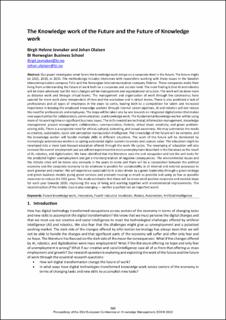| dc.description.abstract | Our paper investigates what forms the knowledge work design on a corporate level in the future. The future might be 2025, 2030, or 2035. The methodology includes interviews with researchers working with these issues in Telia and Telenor. These companies make their living from understanding the future of work both on a corporate and societal level. The main finding is that AI and robotics will be more advanced, but management and organizational structure will be the main changes. The work will be done more as distance work and through virtual teams. The management and organization of work through the coronavirus have opened for more work done independent of time and the workplace and in virtual teams. There is also predicted a lack of professionals and all types of employees in the years to come, leading both to compete for talent and increased importance in keeping the employed knowledge workers through internal career pipelines. AI and robotics will not reduce the need for professionals and employees. The steps will be taken towards an integrated digitalization that makes new opportunities for collaboration, communication, and knowledge work. The fundamental knowledge worker will be using more of his working time on significant business issues. The skills needed are technical, information management, knowledge management, project management, collaboration, communication, rhetoric, virtual team, creativity, and green problem-solving skills. There is a corporate need for ethical, cultural, tolerating, and sexual awareness. We may summarize the requirements as creative, sustainable, social, and perception manipulation intelligence. The future knowledge will be complex, and the knowledge worker will handle multiple skills in different situations. The future knowledge work will be dominated by increasingly autonomous workers co-opting automated digital systems to create and capture value. The education might be revamped into a more task-focused education offered through the work-life cycles. The revamping of education will also increase the overall employment, and we will not experience the mass unemployment described in the literature as the result of AI, robotics, and digitalization. We have identified that the literature uses the unit occupation and not the unit tasks for the predicted higher unemployment and gets the misinterpretation of negative consequences. The environmental issues and the climate crisis will be taken very seriously in the years to come. There will be cooperation between the political and corporate economies to do whatever is possible for sustainability in all internal and external processes to work greener and smarter. We will experience sustainability in action driven by a green leadership through a green strategy and green business models giving green services and products, reusing as much as possible, and using as few as possible resources to reduce the CO2 gases. This study concludes that there will be many small positive corporate and societal steps for each year towards 2030, improving the way of living and working together with environmental improvements. The reconstruction of the middle class is also emerging — neither a perfect nor an imperfect world. | en_US |

